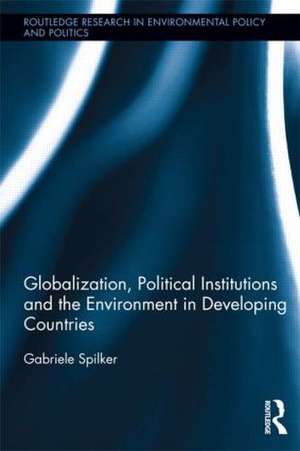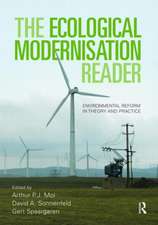Globalization, Political Institutions and the Environment in Developing Countries: Routledge Research in Environmental Policy and Politics
Autor Gabriele Spilkeren Limba Engleză Paperback – 21 mai 2015
In this volume, Gabriele Spilker proposes two factors for the differences in developing countries’ environmental performance: integration into the international system and domestic political institutions. Focusing on developing countries generally but also closely examining important global powers such as China and India, Spilker employs a rigorous quantitative analysis to demonstrate the importance of considering various aspects of the international system, in order to draw more comprehensive conclusions about how globalization affects environmental performance. She asserts that democratic political institutions can shield developing countries from the negative consequences of either trade or foreign direct investment. But at the same time, developing countries, by avoiding demanding commitments, are more likely to use environmental treaties as a cover than as a real plan of action.
Adding a new dimension to the existing body of research on environmental quality and commitment, Spilker convincingly demonstrates how international and domestic political factors interact to shape developing countries’ ability and willingness to care for their natural environment.
| Toate formatele și edițiile | Preț | Express |
|---|---|---|
| Paperback (1) | 381.00 lei 43-57 zile | |
| Taylor & Francis – 21 mai 2015 | 381.00 lei 43-57 zile | |
| Hardback (1) | 1107.79 lei 43-57 zile | |
| Taylor & Francis – 8 dec 2012 | 1107.79 lei 43-57 zile |
Preț: 381.00 lei
Nou
Puncte Express: 572
Preț estimativ în valută:
72.91€ • 76.31$ • 60.68£
72.91€ • 76.31$ • 60.68£
Carte tipărită la comandă
Livrare economică 31 martie-14 aprilie
Preluare comenzi: 021 569.72.76
Specificații
ISBN-13: 9781138914643
ISBN-10: 1138914649
Pagini: 180
Ilustrații: 20 black & white tables, 20 black & white line drawings
Dimensiuni: 152 x 229 mm
Greutate: 0.25 kg
Ediția:1
Editura: Taylor & Francis
Colecția Routledge
Seria Routledge Research in Environmental Policy and Politics
Locul publicării:Oxford, United Kingdom
ISBN-10: 1138914649
Pagini: 180
Ilustrații: 20 black & white tables, 20 black & white line drawings
Dimensiuni: 152 x 229 mm
Greutate: 0.25 kg
Ediția:1
Editura: Taylor & Francis
Colecția Routledge
Seria Routledge Research in Environmental Policy and Politics
Locul publicării:Oxford, United Kingdom
Public țintă
PostgraduateCuprins
1: Introduction. 2: What is Driving Environmental Quality? Domestic versus International Integration. 3: Disentangling the Effect of IO Membership. 4: Joint Effects of Economic Globalization and Political Institutions on Environmental Quality in Developing Countries.5: What is Driving Environmental Commitment? Domestic versus International Integration.6: Treaty Design and Environmental Commitment. 7: Environmental Performance in China and India. 8: Conclusion.
Notă biografică
Gabriele Spilker is a Fritz Thyssen Fellow at the Weatherhead Center for International Affairs at Harvard University. Before going to Harvard University she was a postdoctoral researcher in the “International Political Economy” group at the Center for Comparative and International Studies (CIS) and the Institute for Environmental Decisions (IED). After studying Public Policy and Economics in Konstanz and Prague, she pursued her doctoral studies in Political Science at ETH Zurich and the University of California at San Diego.
Recenzii
"This study pioneers the application of sophisticated statistical techniques and theoretical ideas drawn from modern comparative political economy to environmental politics in developing countries. It is able to rigorously demonstrate the effects of economic growth, integration into the international political system, and the interaction between domestic and international influences. Yet the discussion is easily accessible and provides the reader with considerable insight into the background literature. It should be widely read, not only by those interested in environmental politics but also by all those interested in comparative politics."
—Hugh Ward, University of Essex
"A pioneering and ambitious effort to systematically explain patterns of environmental policy outcomes in developing countries. This book by Gabriele Spilker is a serious contribution to the literature and a must-read for anyone who is interested in environmental politics in the developing world, one of the most important and promising areas for enriching our understanding of global environmental politics."
—Xun Cao, Pennsylvania State University
—Hugh Ward, University of Essex
"A pioneering and ambitious effort to systematically explain patterns of environmental policy outcomes in developing countries. This book by Gabriele Spilker is a serious contribution to the literature and a must-read for anyone who is interested in environmental politics in the developing world, one of the most important and promising areas for enriching our understanding of global environmental politics."
—Xun Cao, Pennsylvania State University
Descriere
Why are some developing countries more willing or able to take care of their environment than others? In this volume, Gabriele Spilker proposes two factors for the differences in developing countries’ environmental performance: integration into the international system and domestic political institutions. Adding a new dimension to the existing body of research on environmental quality and commitment, Spilker convincingly demonstrates how international and domestic political factors interact to shape developing countries’ ability and willingness to care for their natural environment.

















